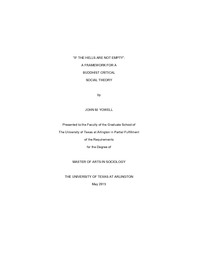| dc.description.abstract | Marx's eleventh Thesis on Feuerbach, which stands immortalized as his epitaph, draws a clear line in the sand between the descriptive philosophy of antiquity and the necessarily prescriptive character which he hoped would mark the philosophers and theorists of modernity; a modernity characterized by rampant alienation and exploitation, income inequality, false consciousness, and suffering on a global scale. Modern critical theory, in its attempt to understand these conditions has grown in scope to include innumerable topics from animal rights to pornography. It has also brought into its fold many distinct disciplines from which it may draw insight into the societies and cultures at which it aims its collective weaponry of interpretation and criticism. While religion has long been an object of discussion for critical theorists, this work proposes that the Buddhist religion possesses such a unique character among the major religions of the world that it can be repurposed as a tool of the modern theorist rather than remain simply another subject to be passively theorized. The purpose of this thesis is to consider the potential of Buddhism as a useful tool for critical social theory in examining and addressing the problems of modernity. While some level of comparative analysis is necessary as exposition, I focus my efforts on developing a dialogical space between Buddhism and a critical social theory rooted in the revolutionary necessity of modernity. Once such a space has been established this work engages in a characterization of modern society in terms of both Buddhist principles and more traditional critical social theory, demonstrating that they are not only compatible but complementary means of achieving a similar understanding of the problems facing modern humanity. This work concludes by advocating a shift in the role of the modern critical social theorist based on the Buddhist ideal of the Bodhisattva and the revolutionary potential and spirit of a socially engaged Buddhism to serve Marx's edict that the role of philosopher is to change the world. | en_US |

